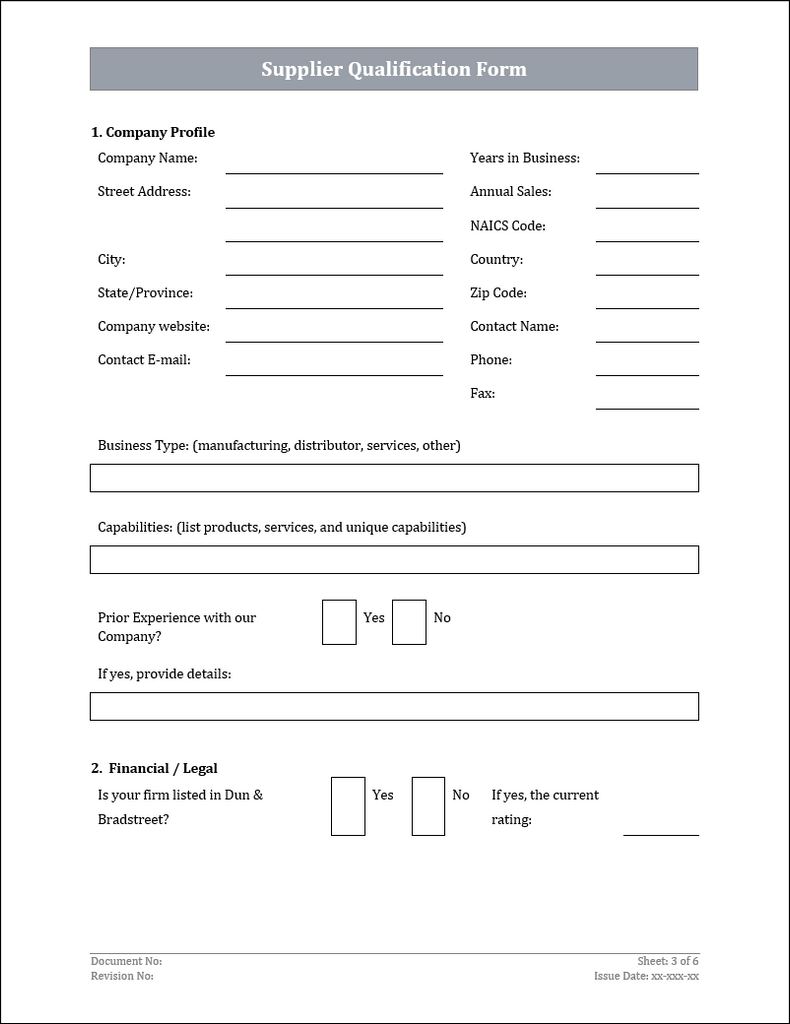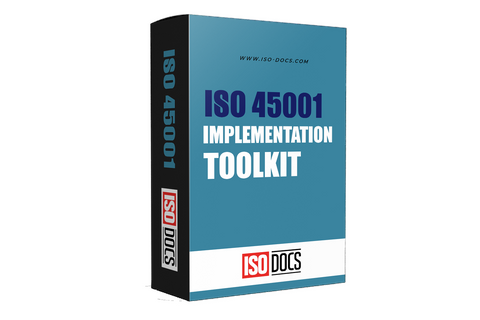ISO 45001 Supplier Qualification Form Template
When it comes to ensuring the quality and reliability of suppliers, having a standardized and thorough qualification process is crucial. One such essential document in supplier management is the Supplier Qualification Form-45001. This form is a comprehensive assessment tool to evaluate potential suppliers based on various criteria such as compliance, performance, and reliability. Understanding the ins and outs of the Supplier Qualification Form-45001 is essential for any organization to streamline its supplier management process and uphold high-quality standards. This blog overviews the Supplier Qualification Form-45001 and its significance in supplier qualification processes.

Importance of supplier Qualification in the Business world
Supplier qualification is critical to successful business in today's competitive marketplace. It involves evaluating potential suppliers based on various criteria to ensure they meet the standards and requirements necessary to provide goods or services to the company. Supplier qualification is essential for several reasons:
- Quality Assurance: Ensuring suppliers meet specific standards is crucial to maintaining the quality of customer products or services. By vetting suppliers, businesses can reduce the risk of receiving subpar products or services that could lead to customer dissatisfaction.
- Risk Management: Supplier qualification helps businesses identify and mitigate potential risks associated with their supply chain. By thoroughly evaluating suppliers, companies can reduce the risk of disruptions, product recalls, or legal issues that could impact their operations.
- Cost Savings: Working with qualified suppliers can help businesses negotiate better terms, lower prices, and reduce overall costs. Establishing long-term relationships with reliable suppliers can also benefit companies in the long run by improving efficiency and achieving cost savings.
- Compliance: Supplier qualification ensures that suppliers meet regulatory requirements and industry standards. This is particularly important in industries with strict regulations, such as healthcare or food production, where non-compliance could lead to legal consequences.
- Reputation Management: Partnering with reputable suppliers positively reflects a company's reputation. Businesses can enhance their credibility and build customer trust by working with suppliers that uphold ethical business practices and produce high-quality products.
supplier qualification is essential for businesses looking to achieve success and sustainability. By thoroughly evaluating and selecting suppliers that meet specific criteria, companies can improve quality, reduce risks, lower costs, ensure compliance, and enhance their reputation in the business world.
Utilizing the Information Gathered From the Form in Decision-Making Processes
- Quality Assurance: Ensuring suppliers meet specific standards is crucial to maintaining the quality of customer products or services. By vetting suppliers, businesses can reduce the risk of receiving subpar products or services that could lead to customer dissatisfaction.
- Risk Management: Supplier qualification helps businesses identify and mitigate potential risks associated with their supply chain. By thoroughly evaluating suppliers, companies can reduce the risk of disruptions, product recalls, or legal issues that could impact their operations.
- Cost Savings: Working with qualified suppliers can help businesses negotiate better terms, lower prices, and reduce overall costs. Establishing long-term relationships with reliable suppliers can also benefit companies in the long run by improving efficiency and achieving cost savings.
- Compliance: Supplier qualification ensures that suppliers meet regulatory requirements and industry standards. This is particularly important in industries with strict regulations, such as healthcare or food production, where non-compliance could lead to legal consequences.
- Reputation Management: Partnering with reputable suppliers positively reflects a company's reputation. Businesses can enhance their credibility and build customer trust by working with suppliers that uphold ethical business practices and produce high-quality products.
supplier qualification is essential for businesses looking to achieve success and sustainability. By thoroughly evaluating and selecting suppliers that meet specific criteria, companies can improve quality, reduce risks, lower costs, ensure compliance, and enhance their reputation in the business world.
Key sections of Form-45001 for assessing suppliers
- Supplier Identification: This section details the information required to identify the supplier, including their company name, contact information, and any relevant certifications or accreditations.
- Evaluation Criteria: This section outlines the specific criteria that will be used to evaluate the supplier, including their health and safety management system, performance records, and adherence to legal requirements.
- Assessment Process: This section provides information on how the assessment will be conducted, including the data collection methods, analysis, and verification.
- Corrective Actions: This section details any corrective actions that may be required if a supplier fails to meet the criteria outlined in the assessment process.
- Continuous Improvement: This section outlines the expectations for suppliers to continuously improve their health and safety management systems to maintain compliance with ISO 45001 standards.
- Monitoring and Review: This section details the process for monitoring and reviewing supplier performance on an ongoing basis to ensure ongoing compliance with ISO 45001 standards.
- Documentation: This section outlines the documentation requirements for suppliers, including records of assessments, corrective actions, and continuous improvement efforts.
- Non-Conformance: This section details non-conformance consequences with ISO 45001 standards, including potential suspension or termination of the supplier's contract.

Criteria for Evaluating Suppliers
- Compliance : Compliance is crucial in ensuring suppliers prioritize occupational health and safety management within their practices. By adhering to the requirements outlined in this standard, suppliers demonstrate their commitment to providing a safe and healthy work environment for their employees. This not only ensures the well-being of workers but also contributes to the overall success and reputation of the organization.
- Health and Safety Policies: When evaluating potential suppliers, it is crucial to consider their health and safety policies. One key question is whether the supplier has documented health and safety policies that align with ISO45001 standards. This standard outlines the requirements for an occupational health and safety management system. It ensures that an organization is committed to providing employees with a safe and healthy work environment.
- Risk Assessment: One critical factor to consider when evaluating a potential supplier is their risk assessment practices. It is important to ensure the supplier has conducted a thorough risk assessment of their operations to identify and mitigate potential health and safety hazards.
- Health and Safety Management System: Does the supplier have a health and safety management system? If so, what certifications or qualifications do they hold (e.g., ISO 45001)?
- Environmental Management System: Does the supplier have an environmental management system? If so, what certifications or qualifications do they hold (e.g., ISO 14001)?
- Compliance: Does the supplier comply with all relevant laws and regulations in their industry? Have they ever faced any compliance issues or violations?
- Capacity and Capability: Does the supplier have the capacity and capability to meet our production volume, lead times, and technical requirements?
- Performance Metrics: What key performance indicators does the supplier track, and how does it measure performance in areas such as on-time delivery, quality, and customer satisfaction?
- Risk Management: Does the supplier have a risk management plan to identify and mitigate potential risks to their business and our supply chain? By completing this Supplier Qualification Form and evaluating suppliers based on these criteria, we can ensure that we are working with reputable, reliable, and high-quality suppliers who can meet our needs and contribute to the success of our business.
Conclusion
The Supplier Qualification Form-45001 is a critical document that helps ensure the quality and reliability of suppliers in a business's supply chain. By carefully evaluating potential suppliers and their capabilities, businesses can minimize risks and ensure the smooth operation of their processes. This conclusion will summarize the critical points of the Supplier Qualification Form-45001 and provide insights on effectively utilizing this tool in supplier management.


